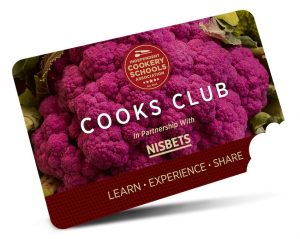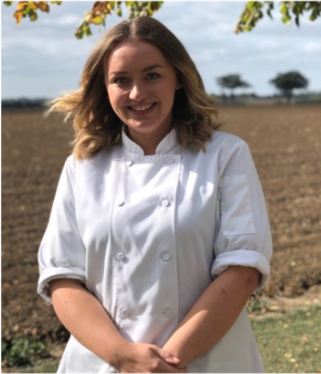ICSA Cookery Schools are selected and ‘Accredited’ for their consistent quality teaching standards and cookery facilities.
Providing reassurance to cooks and students of all levels, gaining transferrable life skills, culinary knowledge and a memorable cookery experience.
Search for your next cookery school which displays the ICSA Mark of Quality Assurance.
MEET CHEF TUTOR:
Sophie-Rose Glover, Food Hub Cookery School, Suffolk
What made you want to become a chef?
I fell in love with cooking because I have always loved eating delicious food! It is always the first thing I think about when I wake up in the morning! Therefore if you want to eat wonderful food you have to learn how to cook it! I never thought about it as a career until I went to University to study Philosophy and found myself spending more time cooking than studying. I came home at my first Christmas break and announced that I was going to cookery school to become a chef- everyone was quite surprised but very supportive! Luckily that gamble 10 years ago paid off and I have never regretted it, now my family and I look back and think ‘of course, why didn’t it occur to us that this was your passion?’
Tell us a little bit about your career journey to becoming a chef tutor.
After studying at Leith’s School of Food and Wine, I worked in various restaurants and did some private cheffing on the side. Then in 2016 I became a private chef full-time and loved traveling the world, cooking for incredible people and gaining insight into produce and a plethora of cuisines. I also worked at Aiglon College Summer School setting up their cookery programme and this kickstarted my passion for teaching. Teaching classes of eight to sixteen year olds who do not speak English is certainly a challenge but so rewarding.
Tell us a little about The Food Hub Cookery School
I have worked at the Food Hub for just over two years, I was due to teach a few classes back in 2020 but then obviously Covid changed everything. I had been looking to change to a job where I would be at home far more and then Emily {owner} came along and offered me the resident teacher job and I jumped at the offer. I still do have some private clients as well but I love to see people returning to the school to learn another skill which is really rewarding.
The school is based on Emily’s family farm in the Suffolk countryside which means we have access to incredible produce and very inspiring scenery. Suffolk is known as the foodie county and the produce is really incredible. We also work with a range of specialist guest tutors and host a wide variety of classes such as Dim Sum and Sushi. We collaborate with Weber and teach their BBQ classes. In March 2022 we set up our Outdoor Kitchen which means we have further expanded our courses.
We also run a number of events on the estate including summer monthly ‘foodie weekends’ which feature a burger night and farmers market. These events showcase wonderful local suppliers and bring the community together.
Tell us a little about your cookery classes
All of our classes suit a range of expertise, we purposely have small class sizes so that I can really tutor every person and encourage them. People find the idea of a ‘professional kitchen’ environment daunting at first but I try to instill confidence in everyone as I truly believe the key to good cooking is confidence.
What can students expect from your style of teaching/their overall cookery experience?
When teaching I like to create a calm atmosphere so that guests can get the most from the course and feel comfortable to ask questions and get involved.
What kind of cookery courses, cuisine or techniques inspire you the most?
I find lots of inspiration from the ingredients themselves, I find people overcomplicate things and therefore flavours become muddled. I really enjoy showing people how to get the most from simple ingredients. Our Vegetarian and Middle Eastern courses are some of my favourite to teach.
What is your own style of teaching cookery students?
I hope that my style of teaching is very down to earth. I don’t want people to ever leave a class thinking ‘that was nice but I’ll never cook it again’. I like showing people how they can substitute ingredients and also use what they have left in their fridge to create similar dishes. I don’t like recipes to be too prescriptive.
Sustainability is one of the five ICSA core values member must adhere to. How do you operate a sustainable kitchen?
My key tip to be more sustainable is to plan your meals therefore you only buy what you need and also become best friends with your freezer! People are hesitant when it comes to freezing food however if you have food leftover make double the recipe and freeze the leftovers!
How do you apply the ICSA core values into your teaching?
• Ensure all our produce is fresh and local. Much is from our own land and gardens.
• Seasonality and low food waste are key
• Efficiently in cooking
• Reduce single use plastics – we encoruage all guests to bring their own cartons to take food home and we supply biodegradable cartons.
3 ingredients we always have in…
This is always such a hard question to answer as we also have different courses going on however I think a running theme is always fresh herbs as they transform a dish, a good quality fat: ie butter/olive oil/rapeseed oil and salt! If your food isn’t seasoned well it will never taste as it’s best!
Which kitchen utensil/gadget could you not do without?
When I used to travel as a private chef I also took a kit of three things as I knew that then I could do anything- a sharp chef’s knife, a sharp peeler and a good microplane. I guess the running theme there is sharp!!
What one essential kitchen tip/subject would you share as a ‘need to know’ for any level of aspiring kitchen gourmand?
I think my main tip to any person who comes to the school is to always complete the recipe even if you think it has gone wrong! People instantly panic and think that they need to throw something away and start again but I always encourage them to cook it and see- you never know! If it is wrong then you will at least learn where you have gone wrong and why. You never stop learning and improving when you are cooking.
What does being an Accredited Member of ICSA mean to you and your cookery school?
Becoming a member of ICSA will be so beneficial for our school as it gives customers even more reassurance that they will come to a quality school and learn some great tips and tricks.
We are always looking to become more environmentally aware and look for guidance from the relevant bodies.
Finally…describe your unique cookery school experience to someone who may never have been?
I hope that we provide a day which is full of information but in a relaxed atmosphere where people are encouraged to improve their confidence and also converse with other guests and share experiences. Of course we do ultimately want them to create delicious food which they can share with their friends and family as really that is what cooking is all about.
Thank you Sophie…now back to your class!
Read more about the Food Hub Cookery School here

Join our ICSA COOKS CLUB:
Learn more about ICSA, our members and receive regular cookery tips from the professionals, along-side some of the industry discounts chef mentions, available from our friends and partners.

